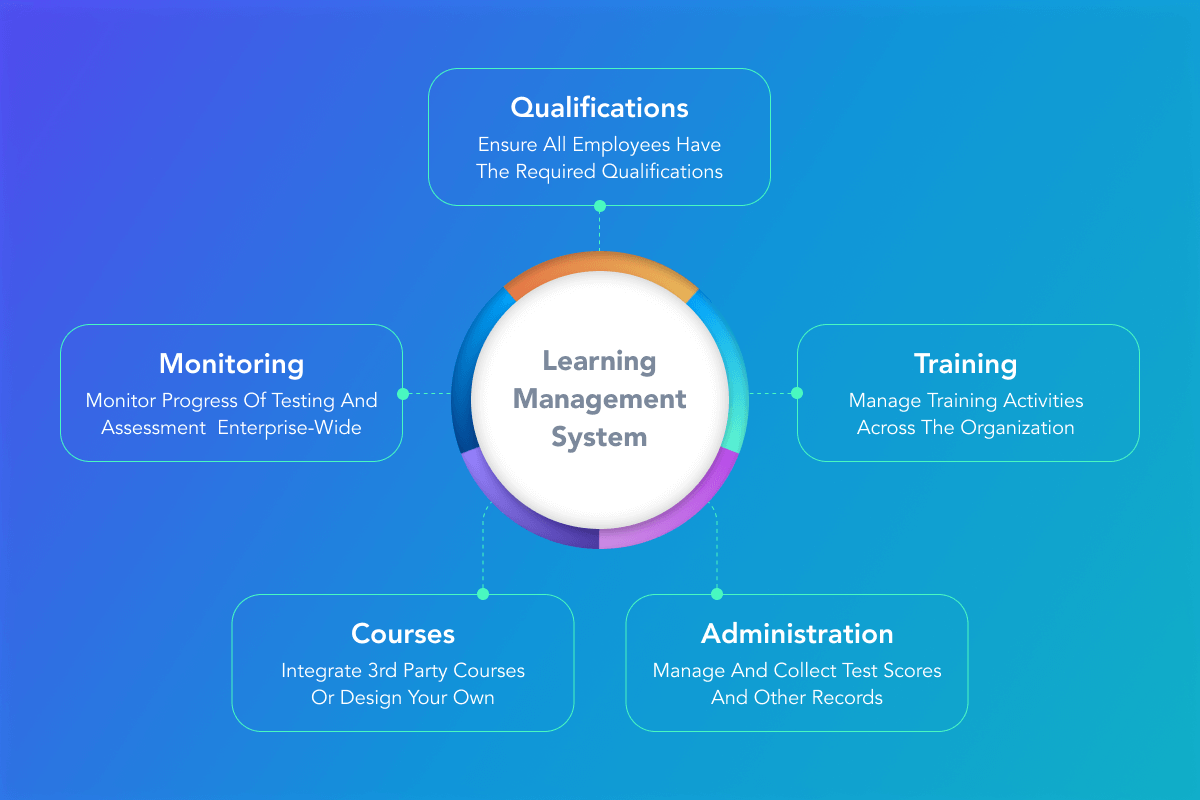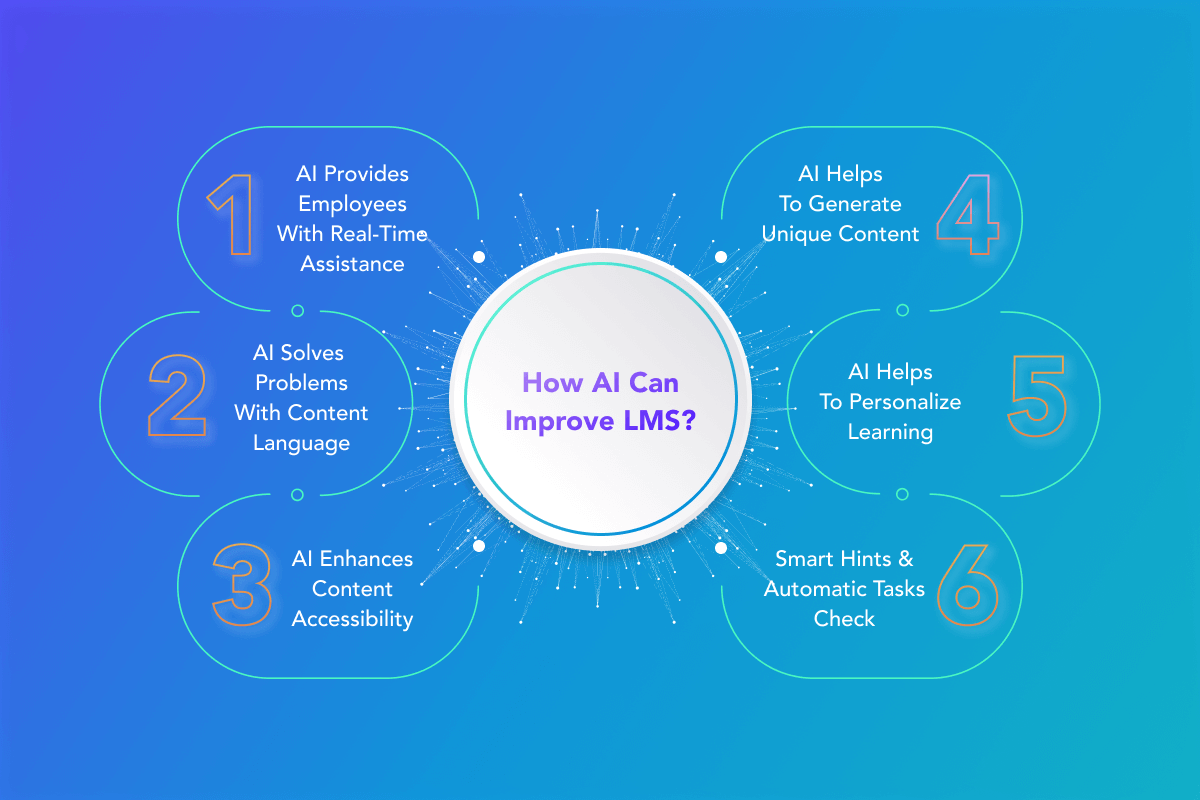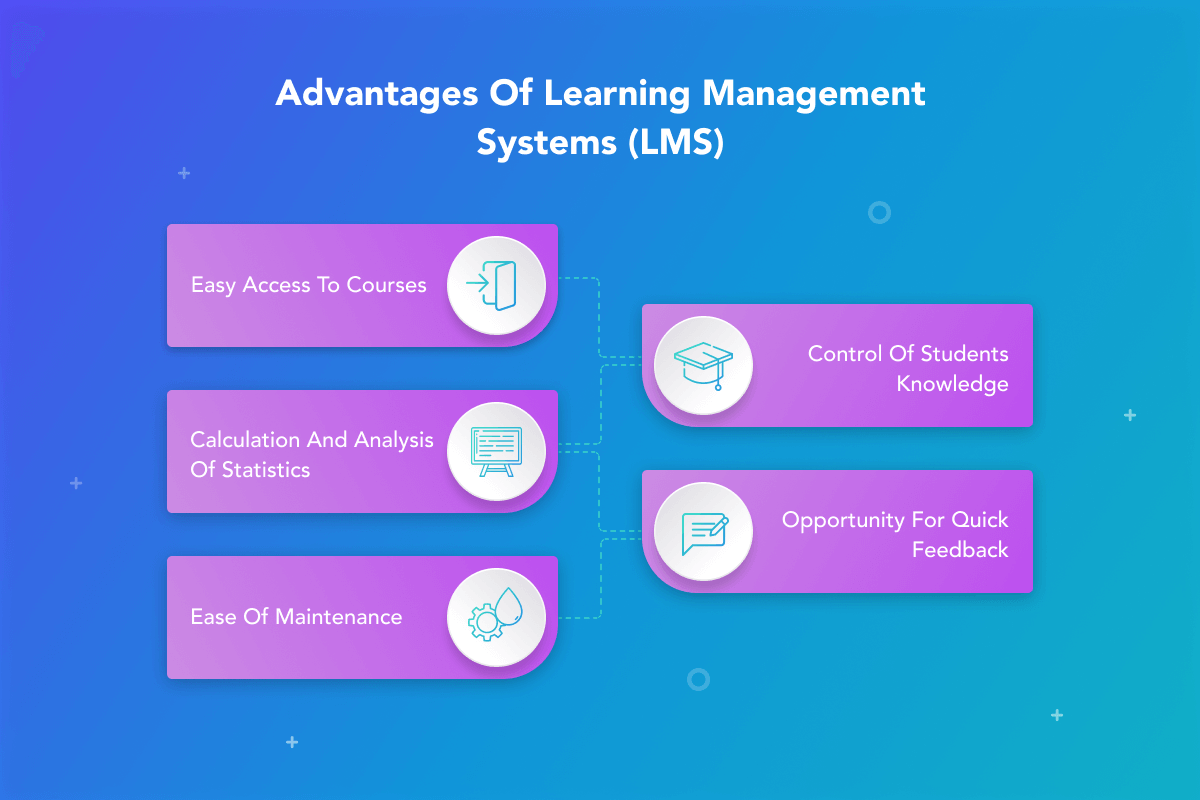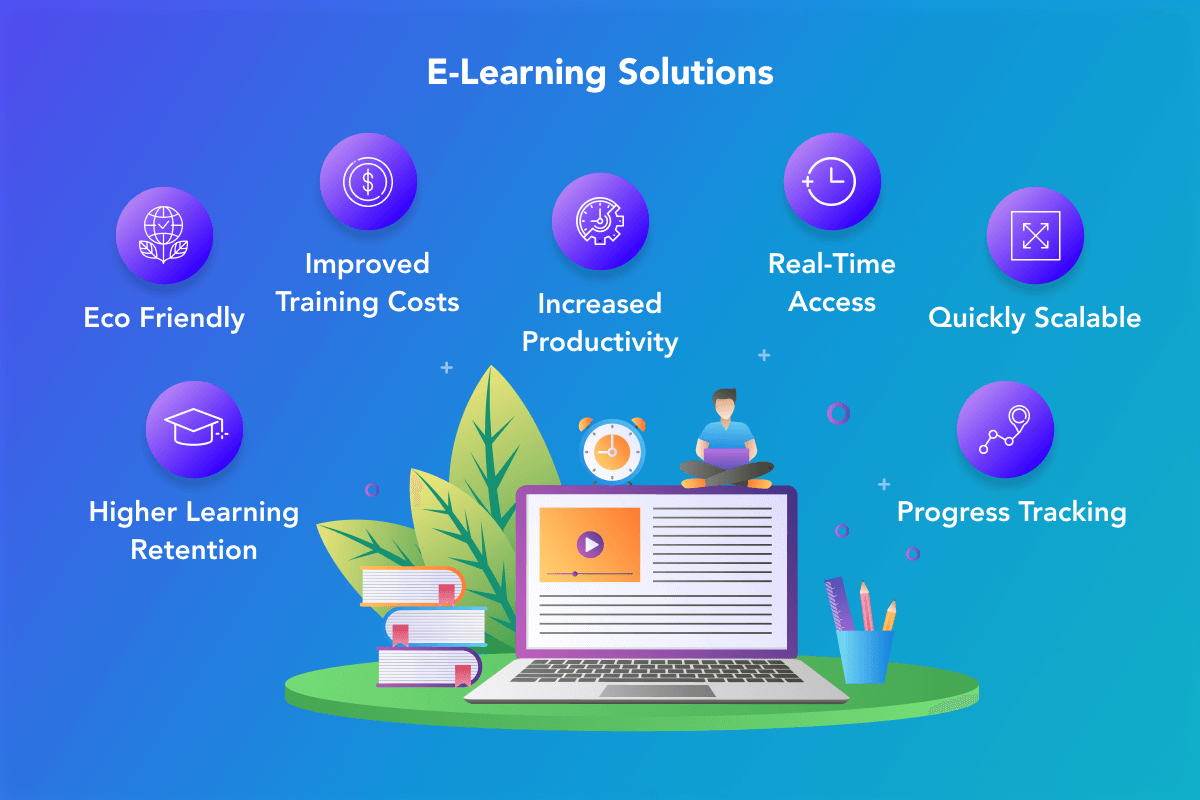AI plays a huge role in business development. Artificial intelligence is becoming more aware of what users think and do. It can analyze what kind of content users seek and provide relevant information. Moreover, AI is able to process data and provide tailor-made solutions that can enhance people’s productivity. In the e-learning industry, AI-powered LMS platforms advise users on what course to take to fill in the knowledge gap, providing needed content on the given topic.
E-learning can be significantly enhanced with Artificial Intelligence. In this article, we will talk about modern LMS, how AI can improve LMS, and its advantages for users.
Download our business case of AI-powered LMS
Before you read the whole article, please look at our AI-powered LMS development project for the NGO organization that will be introduced in 24,000 schools.
What is a Modern LMS?

The Learning Management System (LMS) is a specific management program that is focused on staff training. The LMS solution offers enhanced documentation management, improved administration processes, results tracking, and advanced reporting. Training is performed in digital format, making it especially convenient for remote-working employees. Additionally, LMS trainings are available for both regular employees and newcomers in their onboarding period. As a result, LMS is a valuable tool that increases training and onboarding efficiency, thereby reducing financial and time resources on learning programs.
The abbreviation is composed of three words:
- Learning. With LMS, you create a single database of e-learning courses and training materials. This database is a real treasure trove of knowledge about your topic. Due to LMS, you keep and increase the internal expertise of your company, making it more effective.
- Management. The training is managed by chosen admins. They assign courses, suggest tests, and receive users’ homework.
- System. LMS checks the tests by itself and records how much time a particular user spends on studying. The system analyzes all data and then provides it in a summary report, making it easier to assess employee training progress.
LMS is widely applied by both large enterprises and mid-sized companies, as it allows training not only a small number of people but also thousands of employees anywhere across the world. Onboarding training is an essential part of any company’s success. With LMS, companies can more effectively train their workforce and much more easily manage educational content.
There are two main types of LMS:
- Server LMS
Such a system is installed on the owner’s server, and it gives access to training to those who are connected to this platform. This is the very first type of LMS that was first developed for university students, and it is still very widespread. It is also a popular choice for large enterprises that need full control over the system and its processes.
- Cloud LMS
Content is uploaded to the LMS platform server, and the owner and users get access via the Internet. This is the most common type of platform for remote learning. Because of its simplicity and ease of use, it is chosen by private online schools and large and mid-sized companies that want to improve corporate learning.
How AI Improves LMS?

1. AI Provides Employees with Real-Time Assistance
AI can act as a virtual tutor, answering questions, thereby significantly easing the whole learning process. One of the main problems when learning is the inability to get rid of doubts as soon as they appear in our minds. Sometimes it may be “fear of looking stupid,” so students cannot get advice from the teacher due to their insecurity. It is highly important students could ask questions that need to be quickly answered. Otherwise, it will only complicate the learning process.
By integrating AI into e-learning courses, it is possible to avoid the need to ask teachers or search on the Internet for the right answer every time there is a little confusion or doubt during the learning. All that students have to do is to ask AI and get a needed answer.
2. AI Solves Problems with Content’s Language
Natural Language Processing is a subfield of AI, which is focused on enabling computers to understand and process human languages. Often people learn something in a foreign language. The mother tongue depends on the country where the person has grown up, so it is impossible to create a learning course in all widespread languages. It takes too much time and effort. How often did people wish to talk to their tutors in their native language? Or to communicate with an e-learning platform in a language they prefer? AI can fulfill these desires.
Once you have integrated your e-learning courses with the AI assistant, people can ask questions and clarify details in a preferred language. This will make learning much easier and save time, making learning even more attractive and effective. AI can provide users with content in the language they prefer.
3. AI Enhances Content Accessibility
AI also greatly assists people with disabilities. For example, Microsoft Seeing AI. This free application uses the power of AI to help blind people. It can read texts, recognize signs, describe scenes, define currencies, and identify people standing in front, even emotions on their faces.
AI can play a key role in the training of employees with disabilities. AI can convert spoken language into transcription, thus helping hearing-impaired people easily understand the subject of a discussion.
4. AI Helps Generate Unique Content
In AI, there are always new advances and achievements regarding new content generation. For example, the short sci-fi film Sunspring was fully written by AI, including the title and the whole song. But this is nothing compared to what may happen in the next years.
Interestingly, AI is already being used to obtain responses using existing online learning resources. In the nearest future, AI will be applied to generate all content of an e-learning course, easing the teachers’ work.
5. AI Helps Personalize Learning
Providing the same content to each learner is a very common approach in corporate learning. However, it may be quite time-consuming for an instructor to meet each learner’s needs. But the principle of “one size fits all” does not work anymore, as everyone has their learning style and pace.
AI tracks a person’s previous performance, analyzing constantly coming data to tailor current learning material. AI monitors learners’ progress, identifying areas where each learner is lacking in skill and providing them with appropriate materials. In such a way, AI personalizes students’ education.
6. Smart Hints & Automatic Tasks Check
Using artificial intelligence algorithms, we have improved the LMS system with “smart hints” and automatic task checks.
Read more about E-learning Trends
Advantages of Learning Management Systems (LMS)

Easy Access to Courses
LMS platforms work 24/7, so users can choose a suitable time to learn. There is also no binding to a teacher’s schedule, and there is no strict schedule of classes to get into. To access a course, a person only needs the Internet so that a student can study anywhere worldwide.
Control of Students’ Knowledge
Traditionally, certifying a student takes a lot of time and effort from teachers. With LMS, it is much easy. LMS platforms have built-in tools that control the learning process of students, providing teachers with informative reports about the progress.
Calculation and Analysis of Statistics
Without a remote learning system, it is almost impossible to keep statistics on students’ performance. LMS platforms provide course leaders with detailed statistics and progress analysis, based on which they can easily monitor the progress of students and adjust their curriculum.
Quick Feedback
Modern LMS platforms allow users to address a question to experts and communicate with other students. If needed, group chats with a personal consultation are embedded in modern LMS platforms.
Ease of Maintenance
Advanced LMS platforms are designed to be highly intuitive, so anyone can easily understand how to work with the platform and promptly run the first courses. Course creation, learning management, advanced statistics, and other tools are all in one user-friendly dashboard. With LMS, you can train employees to work with the platform by yourself or hire a professional.
Conclusion

LMS platforms link the traditional ways of online learning into one platform that can be easily managed by system admins. With LMS, learning requires fewer resources, goes to a new level of quality, and gets an opportunity to improve.
Thus, LMS is an important element of a successful company, which cares about its employees’ development, and therefore about development of the whole company. Learning Management Systems can be one of the key elements of HRIS/HRM-systems, separate software, or a part of database on the companies’ intranet.
Learning Management Systems are not a service for a special specialists’ circle, but a tool to organize information transfer processes. It is suitable wherever someone needs to be trained, opening new perspectives for its users. Artificial Intelligence with the appropriate utilization can do wonders in e-learning, however, it may take some time.
For example, we were approached by an NGO from South Africa called TeenGeeks, which wanted to create an online education platform which provides children with access to e-learning. TeenGeeks wanted a kind of modern online education platform for children.
We created a modern online learning platform called ms. Zora. This platform with advanced AI capabilities has wide functionalities and LMS. An important feature of ms. Zora is its adaptability to the South African education system. From a technical point of view, we created a user-friendly LMS web application. Development of this type of software required advanced UI/UX design, quality control, and adaptability, so needed experience and rich knowledge in this area are critical factors in design and development of LMS.






